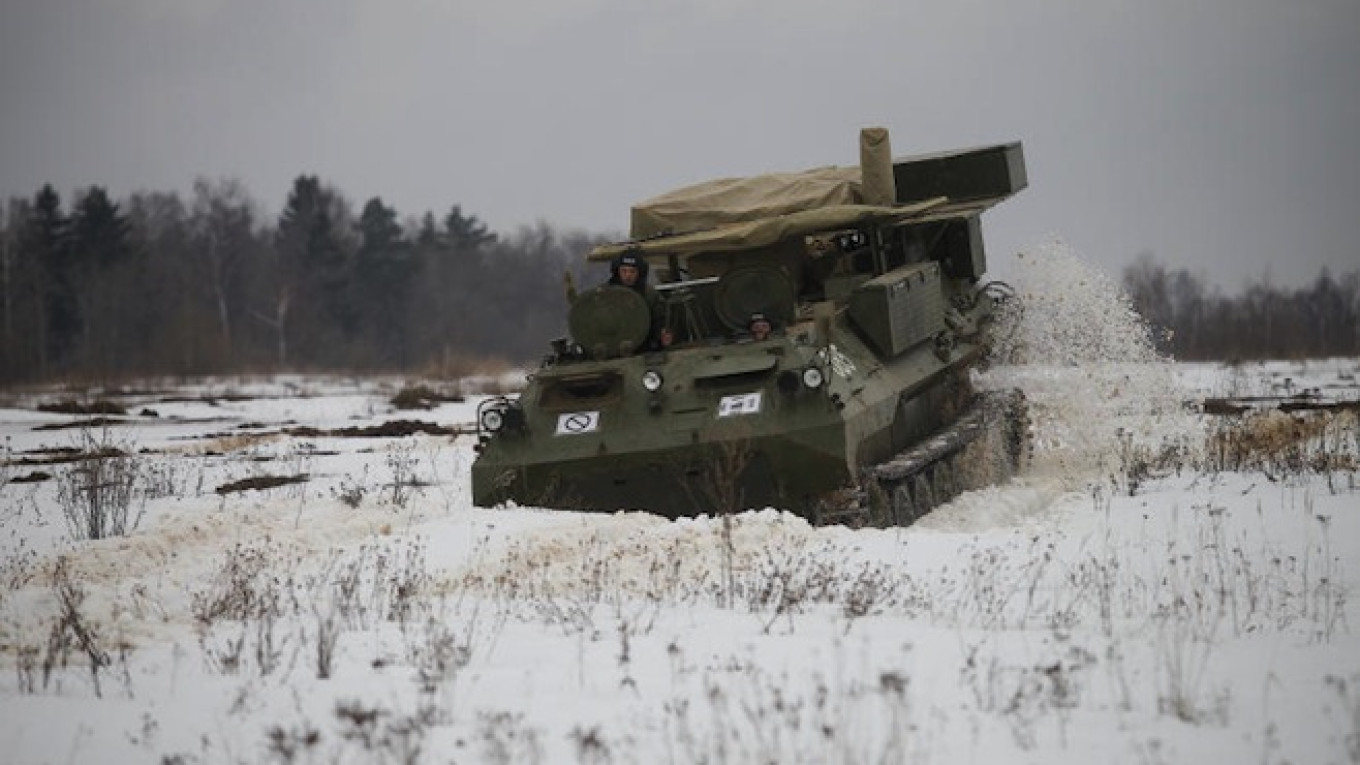KIEV — Russia is boosting its troop presence in eastern Ukraine and attacks from separatist rebels have intensified as they seek to gain more territory from government forces, the Ukrainian military said Wednesday.
Kiev's forces confronted Russian regular troops at an army checkpoint just west of Luhansk after coming under attack there on Tuesday while fighting between government soldiers and the Russian-backed separatists raged on among the ruins of the airport in the city of Donetsk, a spokesman said.
In Moscow, Russian Foreign Minister Sergei Lavrov kept up denials that Russia was militarily involved in the conflict in eastern Ukraine in which more than 4,800 people have been killed. He challenged Kiev to "present the proof."
Ukraine says Russian troops engaged in the east remove identifying tags and insignia from their uniforms to hide their affiliation, much as they did in the early days of the seizure of Crimea by pro-Russian forces culminating in its annexation by Russia in March.
"A significant number of Russian soldiers without insignia have been spotted in Luhansk region," military spokesman Andriy Lysenko said. "There is continued mass shelling of positions and a desire by rebels to expand the territory under their control."
One Ukrainian serviceman had been killed and 40 were wounded in fighting in the past 24 hours, he said.
Separately, Ukrainian Prime Minister Arseniy Yatsenyuk said his government would be seeking to increase the size of the armed forces by 68,000 personnel up to a total of a quarter of a million. Last week, parliament extended mobilization and re-introduced conscription.
Ukraine's charges against Russia were certain to ratchet up tension between Kiev and Moscow before a meeting in Berlin of four foreign ministers that should bring Ukrainian Foreign Minister Pavlo Klimkin face to face with Russia's Lavrov.
Kiev wants a return to the peace process based on a plan that emerged from meetings between Ukraine, Russia and separatist leaders under the auspices of the Organization for Security and Cooperation in Europe in Minsk, Belarus, in September.
A cease-fire declared at the Minsk meeting never got off the ground and hundreds of civilians, Ukrainian soldiers and separatists have been killed since.
The World Health Organisation says more than 4,800 people in all have been killed in the conflict, which erupted last April after Russia's annexation of Crimea, an event which led to the worst crisis between Russia and the West since the Cold War.
Kiev has further accused the separatists of seizing 500 square km (194 square miles) of territory in eastern Ukraine beyond separation lines agreed in Minsk.
Russia's Lavrov on Wednesday acknowledged that the pro-Russian separatists in eastern Ukraine held more territory than was assigned to their control under the agreement.
He said Russia had received assurances from the separatists that they would retreat to the agreed separation lines.
But he stuck to Russian denials of direct military involvement.
"Before demanding from us that we stop doing something, please present proof that we have done it," he said at a Moscow news conference.
Klimkin said he had heard Lavrov's press conference.
"It is useful ahead of Berlin," he said. "I would say one thing: It is by a peaceful deed and not a peaceful word that one complies with the Minsk agreements.
A Message from The Moscow Times:
Dear readers,
We are facing unprecedented challenges. Russia's Prosecutor General's Office has designated The Moscow Times as an "undesirable" organization, criminalizing our work and putting our staff at risk of prosecution. This follows our earlier unjust labeling as a "foreign agent."
These actions are direct attempts to silence independent journalism in Russia. The authorities claim our work "discredits the decisions of the Russian leadership." We see things differently: we strive to provide accurate, unbiased reporting on Russia.
We, the journalists of The Moscow Times, refuse to be silenced. But to continue our work, we need your help.
Your support, no matter how small, makes a world of difference. If you can, please support us monthly starting from just $2. It's quick to set up, and every contribution makes a significant impact.
By supporting The Moscow Times, you're defending open, independent journalism in the face of repression. Thank you for standing with us.
Remind me later.


